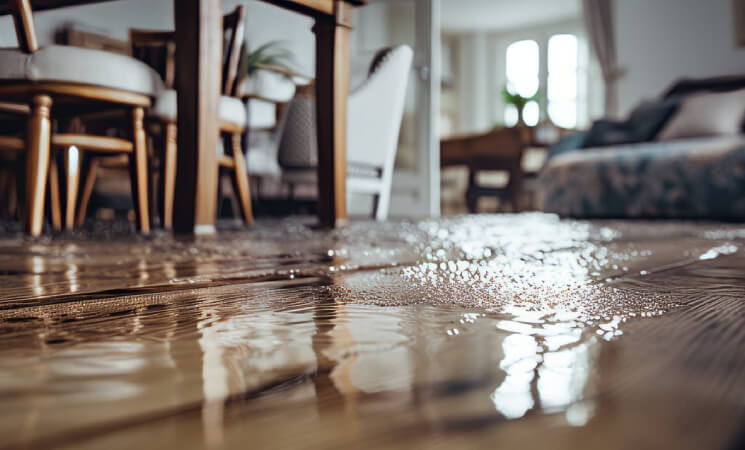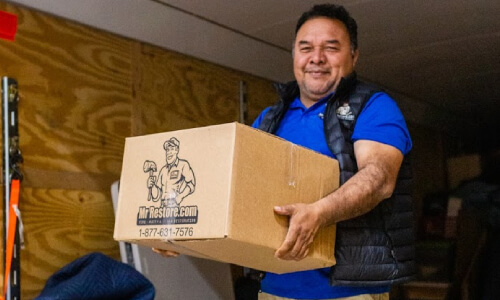Cooler weather is finally upon us! In Texas, this means football season and enjoying some outdoor grilling. It is important to keep you, your family, and your home safe from potential fire, water, and storm damage. Keeping your home warm comes with a few fire risks and hurricane season comes with potential water damage. Check out Mr. Restore’s guide to getting the most out of this fall season safely.
Use Fire Pits and Grills Safely – make sure you are away from structures and debris before setting up and that the area is clean. Wear proper clothing that isn’t loose – such as sleeves or jackets that don’t dangle over the grill or fire pit. Be ready to put out the fire by keeping a fire extinguisher. If you don’t have a fire extinguisher, keep a bucket of sand next to the grill. Never use water to put out grease fire.
Clean out Your Gutters and Downspouts – As the season changes from summer to fall in Texas, the leaves also begin to change and fall. The falling leaves, pinecones, and sticks tend to get stuck in your gutters and downspouts. This causes your gutters to clog, preventing rainwater from flowing properly. If you do not clean your downspouts regularly, the clogged water can spill unto your roof or inside your house, leading to terrible and expensive water damage.
Prepare for Frozen or Burst Pipes – It probably won’t get cold enough for your pipes to burst now but it is a good idea to prepare your pipes for freezing weather ahead of time. If your pipe malfunctions, it can cause serious leaks and spills over time. This can lead to hidden water damage in your walls, under your sinks and under the floorboards (which leads to mold growth!).
To prevent the chances of a pipe bursting in your home, there are many things you can do. Check all pipes in your home that does not have a consistent heat source and provide some sort of insulation to that pipe. After identifying these locations, you can purchase a pipe sleeve from your local hardware store. These are usually an inexpensive investment that will save you thousands of dollars in possible water damage.
Disconnect Your Water Hose – If you are not using your water hose in longer during the colder months, it is a good idea to disconnect it. Water may freeze in the hose, causing a backup of water to overflow. The backup could also negatively affect your pipes!
Practice Chimney Safety – There a variety of things that you can routinely do to ensure that your chimney and fireplace are not at risk for causing fires.
- Have your chimney cleaned and inspected annually – We recommend hiring a certified chimney sweep each year before you use your fireplace. This will ensure that all flammable materials are properly cleaned before use. A certified chimney sweep will also check that everything is operating properly.
- Build small fires – Smaller fires are safer and easier to control. Small, well-built fires reduce the amount of creosote that is created while burning.
- Use dry, seasoned wood – Wet, unseasoned wood burns slowly and creates more smoke, which also increases the amount of creosote produced. Dry, seasoned wood is much safer to use.
- Do not burn any items other than wood – It is critical that you do not burn any liquids or products in your fireplace. Paper, garbage, or any other materials can float into the air and catch creosote in the chimney on fire. Do not use any liquid accelerants in the fireplace because the fire can easily and quickly get out of hand.
- Use a chimney liner and chimney cap – Chimney liners help protect your chimney from excess heating, as well as help provide better airflow. Because a chimney liner allows better airflow, it prevents creosote from easily building up and helps keep it clean. A chimney cap keeps flammable materials, such as leaves and animals, out of your chimney. Both a chimney cap and liner are essential for preventing home fires.
Check Your Heating System – Furnaces are a major cause of house fires in the US. There are a few things you can do, however, that can reduce your risk:
- Keep debris away from the burner area
- Replace furnace filters regularly
- Keep the area around the furnace clean
- Keep any combustible items a minimum of six inches from the vent pipe
A properly working heating system greatly reduces fire risks but also reduces utility costs as they work to heat your space more efficiently. Should you notice any issues with your heating system during the test run, contact a professional immediately. For preventative care, have your central heating system cleaned and serviced by a certified HVAC contractor once annually.
Sometimes even the most prepared homes suffer from water or fire damage during the fall seasons. If you find yourself dealing with damage, immediately contact Mr Restore . Our experienced and trained technicians will walk you through the entire restoration process, from helping you with the claims process to restoring and renovating your home.






